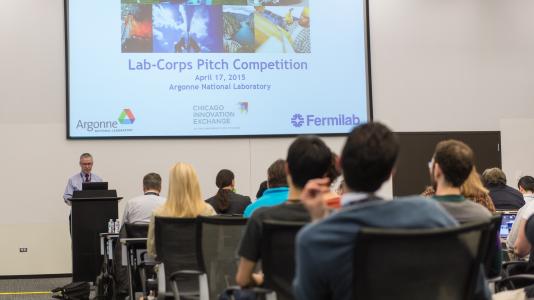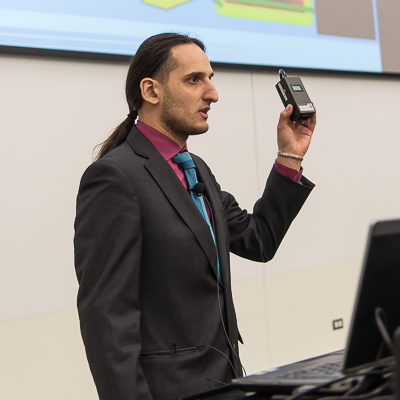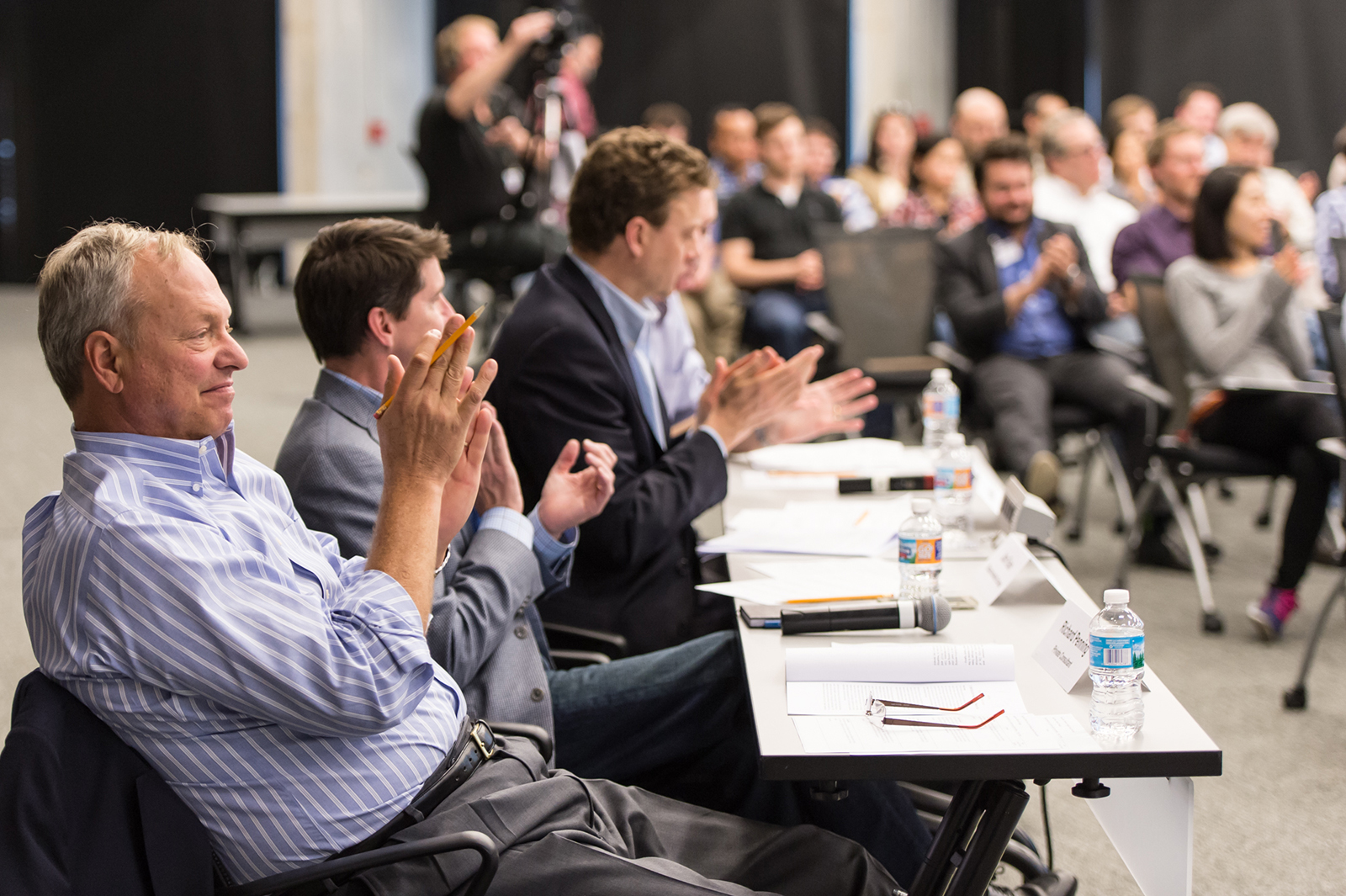
Which has greater commercial potential, an acoustic testing system for detecting energy-wasting air leaks in buildings or a device that can be integrated into electric vehicles to help regulate the frequency of the power grid? According to the judges in the first Lab-Corps Pitch Competition, the answer is, “Both.”
On April 17, the judges chose these two technologies from a pool of six finalists to participate in the national Lab-Corps training program. Each winning team will receive a $75,000 grant to cover the costs of participating. The goal: to learn a set of skills that will help them tell whether a technology is in fact ready to move to the marketplace.
Lab-Corps is a new U.S. Department of Energy (DOE) program aimed at improving the rate of commercialization of technologies created at national labs that are in line with the mission of DOE’s Office of Energy Efficiency and Renewable Energy (EERE). The program is funded by EERE.
“Lab-Corps will teach national laboratory personnel a system for evaluating the commercial potential of technology they have developed and will teach them methods by which technology can be commercialized,” said David McCallum, business capture manager at Argonne and manager of the Argonne Lab-Corps feeder program.
Industry mentors will coach the teams on how to talk to potential customers — at least 100 of them over the eight-week national program. They will discover the customers’ problems, decide if their technology can solve those problems and adjust their business models accordingly. Argonne is participating in Lab-Corps partnership with the Chicago Innovation Exchange and Fermi National Accelerator Laboratory.
At the Argonne Pitch Competition, each team had seven minutes to make its case in a compelling pitch to four judges from the world of entrepreneurship and venture capital. The judges’ choice was a tough one.
“All six of the competing teams are developing technologies that could be really impactful,” said judge John Flavin, executive director of the Chicago Innovation Exchange, which provides support for business start-up activities at the University of Chicago and Argonne. “And all of them had a reasonable chance to see the light of day in the commercial market.”
The quality of the pitches themselves was important.
“A business pitch is very different from a scientific and technical presentation,” McCallum said. “A key skill is the ability to describe their technology and commercialization plans clearly and succinctly in non-technical language.”
Lab-Corps program members at Argonne and the Chicago Innovation Exchange coached the teams on how to hone their performances.
“We had great guidance on how to structure our presentation, what needed to be done to present the ideas to others,” said Vladimir Koritarov, an energy systems engineer at Argonne and member of the Frequency Sensing Charge Controller team, which took first place. “It was a great experience.”
The Frequency Sensing Charge Controller is a device that helps to stabilize the electric grid by automatically adjusting the charging load of electric vehicles. Koritarov, the program manager for his team, said he is eager for the next step.
“We will be talking to a number of industry leads and utilities and seeing what will be the best model for commercialization of this technology,” he said. “I think our device has a future, and I’m looking forward to seeing it.”
Postdoctoral appointee and computational scientist Diego Fazi was the entrepreneurial lead on the project and will also be going to the training. Todd Levin, an Argonne energy systems engineer, and Catharina Milostan, an Argonne energy and environmental policy scientist, also contributed to the winning effort.
Second place went to the team behind SonicLQ, a system that uses acoustic holography to map and quantify costly air leaks in buildings. Milostan, that team’s entrepreneurial lead, and Ralph Muehliesen, an Argonne building scientist and the team’s principal investigator, see weatherization companies as the initial market for their technology. They hope the Lab-Corps training will help them decide whether to license the method or to form a start-up company. But learning how to prepare a pitch has been valuable in itself, said Muehliesen.
“That skill set is essential for us to learn even if we’re not selling products. So even if nothing comes of this, I can do a much better job when I have to go talk to (Assistant Secretary for Energy Efficiency and Renewable Energy) David Danielson and convince him in five minutes that he needs to invest in this program,” he said.
The program organizers see the Pitch Competition and Lab-Corps itself as only first steps in a continuing process of encouraging technology transfer at the Lab.
“We’re in a unique spot with the University of Chicago, Argonne National Lab, and Fermilab working together,” Flavin said. “We have the opportunity to provide the right support structure to help these innovators who want to commercialize their idea get it onto the commercial path. What will happen from here is that it will only grow.”
The judges named a third-place finisher, Dynamic Aperture, maker of a device designed to help manufacturers increase the efficiency of photovoltaic cells used in solar panels. That team consists of Ray Conley, optics fabrication section leader at Argonne, and Elina Kasman, an X-ray optics fabrication specialist at Argonne.
In addition to Flavin, judges were Richard Penning, an independent consultant; Andrew Williamson, of True North Venture Partners; and Erik Birkerts, Executive Vice President & COO at Clean Energy Trust.
Argonne National Laboratory seeks solutions to pressing national problems in science and technology. The nation’s first national laboratory, Argonne conducts leading-edge basic and applied scientific research in virtually every scientific discipline. Argonne researchers work closely with researchers from hundreds of companies, universities, and federal, state and municipal agencies to help them solve their specific problems, advance America ‘s scientific leadership and prepare the nation for a better future. With employees from more than 60 nations, Argonne is managed by UChicago Argonne, LLC for the U.S. Department of Energy’s Office of Science.
DOE’s Office of Science is the single largest supporter of basic research in the physical sciences in the United States, and is working to address some of the most pressing challenges of our time. For more information, please visit science.energy.gov.

